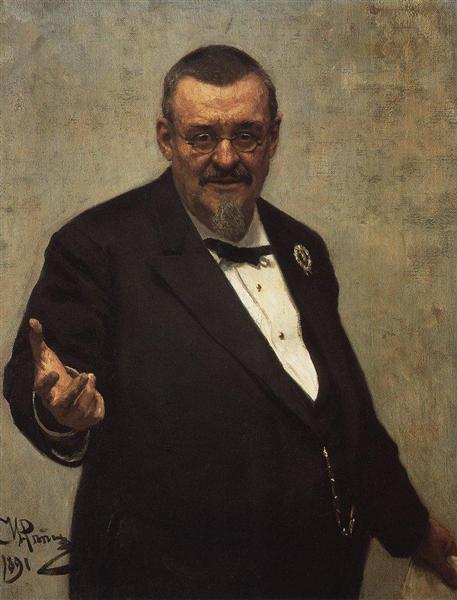תיאור
הציור "דיוקן של עורך הדין ולדימיר ספסוביץ '", שנעשה על ידי איליה ריפין בשנת 1891, הוא יצירה המכה את ההבנה הניואנסית של הפסיכולוג והפורטרטסט שאפיין את הפקת האמן הרוסי. Repin, אחד החברים הנודעים ביותר בבית הספר לאמנות ריאליסטית ותנועת "טיולים" (קבוצת אמנים שקידם גישה נגישה ומציאותית יותר לאמנות), משיג בדיוקן זה איזון בין הייצוג הנאמן והנאמן חקירה פסיכולוגית עמוקה של הנושא.
בציור מופיע ולדימיר ספסוביץ 'בסביבה המעוררת את מעמדו המקצועי כעורך דין. השימוש ברקע ניטרלי וכהה, שיכול להתפרש כרמיזת לרצינות ופורמליות של המקצוע שלו, מאפשר לצופה להתרכז בדמות הראשית. ספסוביץ 'מכוסה בחליפה רשמית ואופיינית של התקופה, המדגישה את סמכותו ואת כבודו של האדם שהוא מייצג. בחירת הצבעים היא מכריעה; הרקע הכהה מנוגד לגוונים הברורים של הפנים וידי ספסוביץ ', ויוצר אפקט שיפור המדגיש את האקספרסיביות של אופיו.
תווי הפנים של ספסוביץ 'מעוצבים בבירור, תוך תשומת לב עדינה לפרטים המשקפים את אופיים. המראה מעט מהורהר ונטייתו האור של ראשו משדרים תחושה של התבוננות פנימית ועומק רגשי. גישה זו מתיישבת עם המטרה של הדבקה לא רק את המראה הפיזי של הנושא שלה, אלא גם את המהות הפנימית שלה. בביטוי של ספסוביץ 'אתה יכול לאתר תערובת של נחישות והשתקפות, מה שמרמז על המורכבות של חייך המקצועיים והאישיים.
Repin, הידוע ביכולתו ליצור דיוקנאות החושפים את הפסיכולוגיה של נתיניו, גילה עניין מיוחד במצב האנושי ובביטויים האותנטיים של רגשות. בדיוקן זה, השימוש באור ראוי גם לתשומת לב. נראה כי התאורה שמרחץ את פניו של ספסוביץ 'מגיעה ממקור טבעי, שמוסיף מימד נוסף של ריאליזם וקרבה, ומדגיש את הדיאלוג בין הצופה למוצג.
טכניקת ה- Repin, המשלבת משיכות מכחול רופפות ולוח צבעים עשיר, מציעה מרקם חי שמזמין את הצופה לחוויית מגע, כמעט כאילו הוא יכול להרגיש את מרקם החליפה או עורו של האיש המוצג. יכולת זו מאפיינת את סגנון ה- Repin ומשקפת את היווצרותו באמנות אקדמית, יחד עם התעניינותו בריאליזם ורגש.
דיוקן ספסוביץ 'הוא גם ביטוי להקשר ההיסטורי והחברתי של רוסיה במאה התשע עשרה. דמותו של ספסוביץ 'הייתה לא רק חוק חוק, אלא גם בעיצומם של התמורות החברתיות הגדולות שהגדירו את הזמן, בו התפתח כל הזמן תפקידם של אינטלקטואלים ואנשי מקצוע. באמצעות עבודתו, Repin לוכד את מהותה של רגע בתולדות רוסיה, ומציע חלון לחייהן ולדאגותיהם של גברים, שכמו ספסוביץ 'הפליגו בין מסורות עתיקות לזרמי המחשבה החדשים.
לסיכום, "דיוקנו של עורך הדין ולדימיר ספסוביץ '" מאת איליה רפין מוקם כיצירת מופת לא רק בגלל המיומנות הטכנית של האמן, אלא גם בגלל העומק הפסיכולוגי שהוא מצליח להעביר. דיוקן זה הוא לא רק מחווה לאדם, אלא זהו עדות של עידן, השתקפות על זהות מקצועית ואישית, ודוגמא לכוח האמנות לתפוס את המורכבות של החוויה האנושית. עבודות Repin נותרות מקור להשראה והשתקפות, ומזמינה את הצופים להרהר לא רק במה שהם רואים, אלא גם את מה שהם מרגישים לנגד עיני הצעות.
KUADROS ©, צבע מפורסם על הקיר שלך.
ציורי שמן בעבודת יד, עם איכות אמנים מקצועיים וחותם ייחודי של KUADROS ©.
שירות רבייה בתמונות עם ערבות שביעות רצון. אם אינך מרוצה לחלוטין מהעתק הציור שלך, אנו מחזירים את הכסף שלך 100%.

